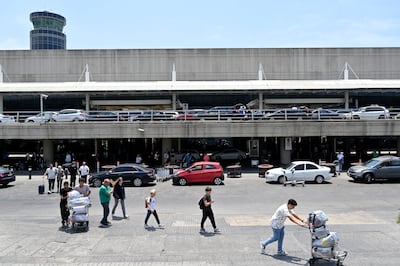Live updates: Follow the latest news on Israel-Gaza
Germany and the Netherlands have become the latest countries to call for their citizens to leave Lebanon, amid rising tensions between the Lebanese armed group Iran-backed Hezbollah and Israel, raising fears of a war.
The European nations joined Canada, North Macedonia and Kuwait in urging their citizens to leave the country amid further escalation on the Lebanon-Israel border.
Germany stated that its citizens “are urgently urged to leave Lebanon” in an updated travel advisory. “The current heightened tensions in the border area with Israel could escalate further at any time,” it said.
“Germans in Lebanon are urgently asked to leave the country. The situation at the border between Israel and Lebanon is very tense,” the German Foreign Ministry said on X.
This came after German Foreign Minister Annalena Baerbock visited Lebanon, during which she warned that any “miscalculation” could lead to an all-out war between Israel and Hezbollah.
“With every rocket fired across the Blue Line between Lebanon and Israel, the risk increases that a miscalculation could trigger a hot war,” Ms Baerbock said.
The Netherlands issued a warning on Wednesday for its citizens to leave Lebanon while commercial flights are still operating.
“It is unsafe in Lebanon, and the situation remains very unpredictable,” the Foreign Ministry said.
Earlier, Canada, North Macedonia, and Kuwait advised their citizens to leave Lebanon “while they can” due to the deteriorating security situation.
Other countries have updated their travel advice, warning against all travel to Lebanon and encouraging citizens living there to leave.
On Wednesday, the Swiss Embassy in Lebanon and Syria said that travel to Lebanon “has now become generally inadvisable”.
“A significant deterioration of the security situation in Lebanon can occur at any time,” it said.
Earlier this month, the US Embassy in Beirut advised its nationals to avoid travel to the Lebanon-Israel border area, the Lebanon-Syria border area, and refugee settlements.
The US Embassy issued a reminder on Thursday urging its citizens to “strongly reconsider travel to Lebanon”.

Impact on tourism
The conflict has had a severe impact on the small country's hospitality sector, which was just starting to recover from years of economic crisis, with many foreigners cancelling travel plans.
In the first quarter of this year, Lebanon saw a 13.52 per cent decrease in inbound visitors, mainly because fewer Europeans and North Americans visited, according to Blominvest Bank, Lebanon's largest lender, citing Ministry of Tourism data from last month.
However, several hotels in Beirut told The National that they have not seen a decline in bookings, as Lebanese residents living abroad are still returning home.
“We haven’t really had any cancellations. For the Lebanese, the unstable situation is pretty normal for them,” said an employee from Smallville, a hotel in the central neighbourhood of Badaro.
“We are not affected by the crisis because we have a clientele that comes regardless of the situation in Lebanon. They’re long-standing guests – mostly diaspora families and business people,” said a front office manager at Albergo, an upmarket hotel in Beirut.

Hezbollah, an ally of Hamas, and Israel have been exchanging daily fire at the Lebanon-Israel border since October 8, a day after the militant group opened a pressure front to divert Israel from its attacks on Gaza, where it says it is fighting to destroy Hamas.
Tensions have escalated in recent weeks as diplomatic efforts have stalled. During a visit to Washington on Thursday, Israeli Defence Minister Yoav Gallant said that his country could “take Lebanon back to the Stone Age, but we don't want to do it”.
On Wednesday, UN humanitarian co-ordinator Martin Griffiths said that Lebanon was “the flashpoint beyond all flashpoints”.
Israel has prepared for a land incursion into southern Lebanon to restore security for its displaced residents on the northern border. Tens of thousands have been displaced on either side of the border.
Hezbollah said that it does not want war but is ready for one if it is imposed on Lebanon. Hezbollah leader, Hassan Nasrallah, has repeated that it will not stop their attacks until a ceasefire is reached in Gaza, where more than 37,700 Palestinians have been killed.
The deaths came after Hamas launched an unprecedented incursion into southern Israel on October 7 that killed about 1,200.
According to an AFP tally, 481 people have died in Lebanon as a result of the Israel-Hezbollah clashes since October 8th, including 94 civilians. On the Israeli side, at least 15 soldiers and 11 civilians have been killed, according to Israel.
